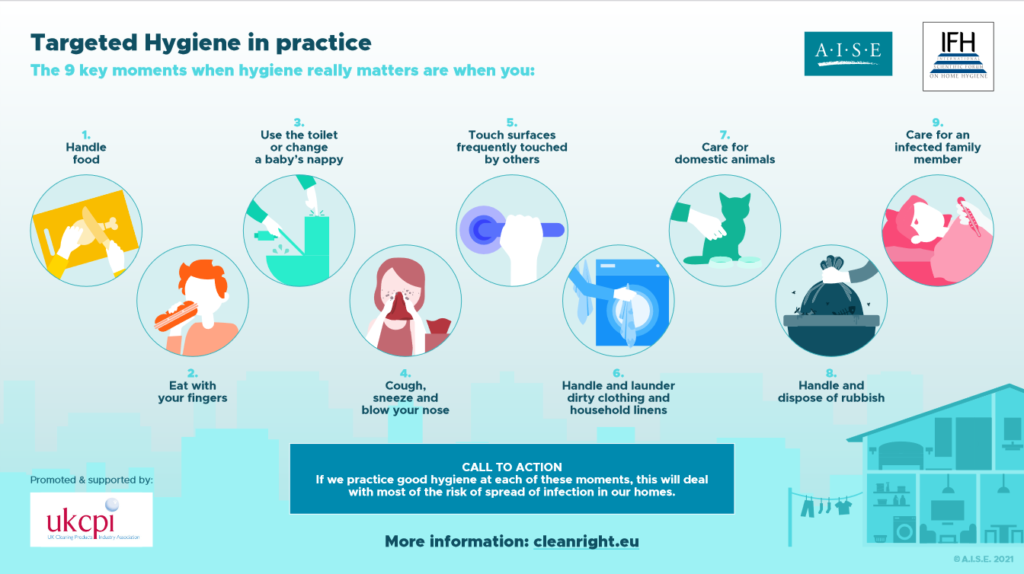Posted by Charlotte Salter, on April 8, 2021.
A new report highlighting the critical role that hygiene plays to help prevent the spread of infectious diseases was launched this week, coinciding with World Health Day.
The joint report, from the International Scientific Forum on Home Hygiene (IFH) and the International Association for Soaps, Detergents and Maintenance products (A.I.S.E.) also shares insights into current consumer understanding of hygiene.

Whilst 87% of EU consumers believe that cleaning and hygiene in their home is important because it helps them, or the people they live, with avoid becoming unwell or getting an infectious disease, the research highlights that – although consumers’ actions are to some extent guided by their perception of risk – there was limited understanding of what are key risk situations, and when (and where) hygiene is needed. 78% of consumers claimed that they were using disinfectants prior to the COVID-19 pandemic, and this increased to 82% in June 2020 over the course of the pandemic. Consumers reported using disinfectants in some situations where experts believe they are indeed needed, whilst in other similarly risky situations, they are only rarely used. The report also shows that they were used in situations normally considered as “low risk”.
Consumer data also show that, despite the fact that the COVID-19 pandemic provided an unprecedented opportunity for hygiene promotion, there was little evidence that this has altered consumers’ perception of risk and hygiene behaviours. Even in June 2020, only 44% of EU citizens felt that not washing their hands with soap after sneezing into them poses a high risk of causing infection, and 36% claimed that they would always wash them (in contrast to 32% in February 2020).
Professor Didier Pittet, Director of the Infection Control Program at the University of Geneva Hospitals and Faculty of Medicine in Geneva, Switzerland, and adviser to the World Health Organization for the “SAVE LIVES: Clean Your Hands” initiative, said: “Going forward into the 21st century, if we are to address the infectious disease issues we now face, we must ensure that hygiene in our homes and in our everyday lives is recognised as an equal partner to hygiene in healthcare and other settings and pay greater attention to improving hygiene understanding and hygiene behaviour”.
The report promotes good hygiene – the practices through which people maintain or promote good health and help prevent the spread of infectious diseases – and the appropriate use of cleaning and disinfectants products. In particular, it promotes the principles of Targeted Hygiene, an approach which argues that, to be effective, hygiene practices need to focus on the times and in the places that matter to break the chain of infection and reduce the risk of exposure to harmful microbes, focusing on 9 key moments. It also explains the two main hygiene procedures which can be used: using detergent-based cleaning products, and in some cases, when needed, using a hand or surface disinfectant. This report evaluates the ways in which household hygiene is changing to meet 21st century needs.
Dr Susanne Zänker, A.I.S.E. Director General, said: “We believe that getting consumers to adopt this scientifically-proven targeted approach to hygiene in their home and everyday life could have a significant impact on reducing the spread of infection and securing better health for European citizens. Our industry is committed to promoting appropriate use of disinfectants only when and where needed, in line with these principles.”
A further barrier to behaviour change highlighted by the poll is a lack of clarity about what the term “hygiene” actually means, suggesting that consumers may interpret product claims and instructions for use differently, based on what they believe these terms mean.
Professor Sally Bloomfield, Chair of the IFH said: “These results are a huge contribution to achieving a better understanding of consumers’ perceptions and behaviours in Europe. They also confirm that, if activities aimed at consumer behaviour change are to be successful, they must be accompanied by consumer education on the basic concepts of Targeted Hygiene, in partnership with all hygiene stakeholders.”
In conclusion, the report sets out a number of actions that need to be taken, in order to maximise effectiveness of hygiene whilst at the same time addressing sustainability matters.
About the report
“Developing household hygiene to meet 21st century needs – A collaborative industry/academia report on cleaning and disinfection in homes & Analysis of European consumers’ hygiene beliefs and behaviour in 2020”
About IFH
The International Scientific Forum on Home Hygiene is a leading scientific authority on home hygiene. It is a not for profit, non commercial, Registered Charity in the UK which was established in 1997 with the mission to promote health and wellbeing through improved hygiene (infection prevention and control) in home and everyday life settings. The IFH is unique in that it addresses hygiene from the viewpoint of the home and, more importantly, the family or household. www.ifh-homehygiene.org
Contact: sallyfbloomfield@aol.com
About A.I.S.E.
The “International Association for Soaps, Detergents and maintenance products” (A.I.S.E.) has been representing the detergents and maintenance products industry in Europe to EU regulators for over 65 years. Through its extensive membership network of 29 national associations, 18 corporate members and 13 value chain partners, A.I.S.E. represents over 900 companies supplying household and professional cleaning products and services across Europe. A.I.S.E. has a long history in leading voluntary industry initiatives that focus on sustainable design, manufacturing and consumption, product safety and safe use of products by consumers and professional customers. Based in Brussels, A.I.S.E. is the key industry body providing industry’s expertise to EU policy makers on regulatory matters; its role is also to support its members in the adequate implementation of such regulations.
www.aise.eu and its consumer portal www.cleanright.eu
Contact: valerie.sejourne@aise.eu
